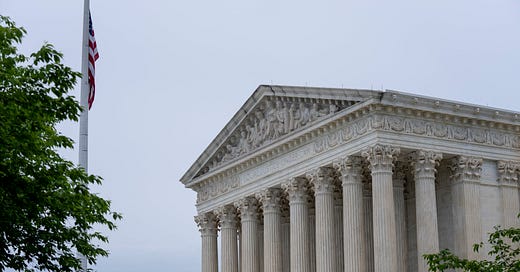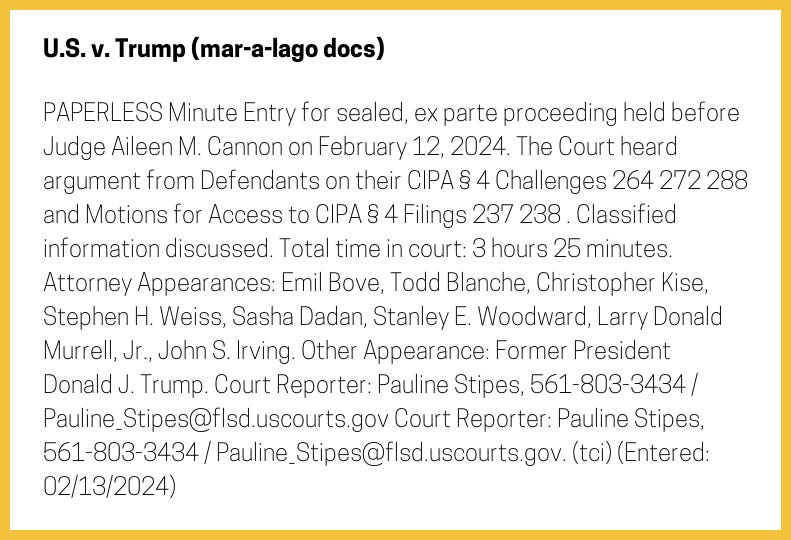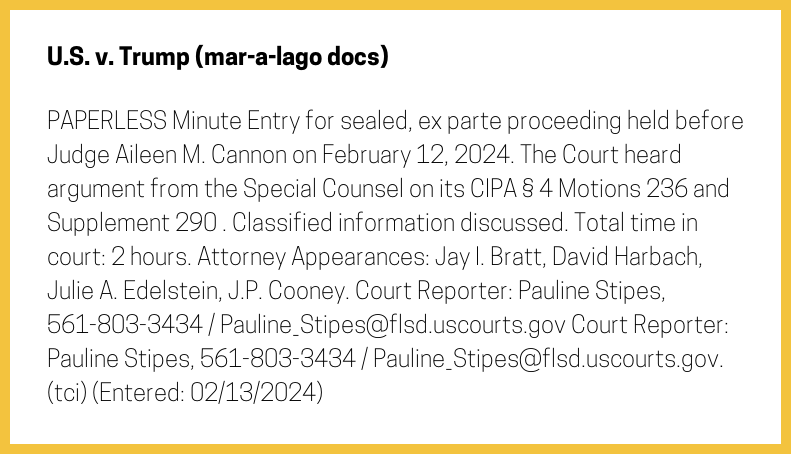On Monday, Donald Trump filed an application with the Supreme Court, asking them to keep the stay on further proceedings in the trial court in place while he prepares his writ of certiorari—his request to SCOTUS to reverse the decision by the Court of Appeals that his prosecution isn’t barred by presidential immunity. That’s a mouthful, but it’s important to keep precise track of where we are procedurally. Right now, Trump is only asking the Court to keep the government from resuming trial preparations in the district court while the Supreme Court is deciding whether it will review the Court of Appeals’ decision against Trump.
Chief Justice Roberts handles requests like this from the Court of Appeals for the District of Columbia, as other Justices do for other circuits. Some requests are referred to the full Court for a decision, but all that was needed here initially was a date for the government to respond by, and the Chief Justice went ahead and set that. He gave Jack Smith’s team until Tuesday the 20th at 4 p.m. I wouldn’t take a bet against Smith filing earlier than that.
As we noted Sunday night, the Supreme Court can treat Trump’s request for a stay as a request to hear the full case on a writ of certiorari. Or they can limit their decision to whether proceedings in the trial court will continue to be stayed while they’re deciding whether to hear the case. I think it’s difficult to read the tea leaves here with any clarity. We don’t have any window into what the Court is thinking, and the Justices aren’t telling anyone before they make their decision, so anything you hear is speculation. The good news is that they aren’t likely to keep us in suspense for too long, and I’d expect we’ll know how they intend to handle the case no later than the end of next week.
Are there five votes on the Court to give Trump what he wants—more delay—knowing that the Court’s decision in this case may well shape the future of the country more than any other single decision it makes? The Court has shown itself to be remarkably well insulated from public concerns, as with its refusal to do anything about the Clarence Thomas debacle, but it strains credulity to believe that here, the Court fails to understand that delay serves only one purpose. And that purpose has nothing to do with justice.
Should we read anything into the full week Smith has to respond instead of just days? Does it suggest a lack of urgency? On the one hand, a week is fast as Supreme Court time runs. But this Court recently considered, and denied, Jack Smith’s request that they hear the presidential immunity appeal directly, without waiting for the Court of Appeals. That could be read as a signal they’re not on board for a fast decision (although it could also mean they wanted to let the case proceed normally and give the Court of Appeals the first crack at it). As I said, we’re speculating here, which is hard to avoid in a case of this significance.
What we do know for certain is that the Court has a number of options:
The speediest one would involve denying any further stay, treating Trump’s request as one to grant certiorari and denying that request, affirming the Court of Appeals' decision against Trump, and sending the case back to Judge Chutkan to prepare for trial.
The outcome that would signal the case is on a slow boat would involve granting the stay and ordering briefing on whether the Court should hear the dispute (grant cert), pushing that decision off for weeks or longer, and then issuing a lengthy briefing schedule and not deciding the case until so late in the term that a trial before the election is completely off the table.
The Court also has intermediate options; for instance, keeping the stay in place but expediting briefing and oral argument, like they did with the 14th Amendment case, and then rendering a prompt decision. This approach seems more reasonable, but again, we just don’t know where the votes are on the Court right now. A process like this could still consume a couple of months, but it would still leave Judge Chutkan with the ability to complete discovery and pre-trial motions and schedule the case for trial this summer. She previously intimated to attorneys in another case that she might cancel summer vacation plans to hold this trial. This kind of timeline would see the Manhattan DA’s case go to trial as scheduled in late March, and slot the federal election interference case in after it concluded.
Trump’s primary goal here continues to be (and I know you’re going to be shocked) delay. He not only wants the stay that prevents any further preparation for trial to remain in place, he asked SCOTUS to do something else that would afford him an extra measure of delay. When the three-judge panel at the Court of Appeals ruled, they explicitly told Trump that if he sought rehearing en banc from the full court, the stay would be lifted, and Judge Chutkan could get back to work. Trump has asked the Supreme Court to countermand that decision so he can go the en banc route before he goes to SCOTUS, giving him more time before he has to face the piper—a jury of his peers. Look for Jack Smith to push back sharply on this request and to ask the Court to act quickly and treat Trump’s request as one to decide whether to take the case on appeal instead of just resolving the stay issue to get everything in motion.
In his filing, Trump was dismissive of Smith’s argument that the people—all of us—have the right to a speedy trial in this matter. This is an argument Smith has made before, and it is well supported by precedent from other cases. Trump’s lawyers didn’t really offer a response. They just made light of the fact that the people of the United States could have rights here, too. They suggested other priorities were more important. It’s an interesting strategy and consistent with Trump’s constant whine that he’s the subject of a witch hunt, although this argument is made at a lower pitch, suggesting that this important case deserves plenty of time for consideration and shouldn’t be rushed. So the Court will have to squarely decide whether, as citizens, we have a right to see the criminal trial of a former president proceed on a timely basis.
Trump is asking the Court to decide whether the doctrine of presidential immunity is an absolute bar to any criminal prosecution and also whether his prosecution is barred because he was acquitted on the articles of impeachment. The answers to these questions seem to be clearly no, at least if the Supreme Court wants to continue the American experiment with democracy. If the answer is yes to democracy, then it's imperative to move this case forward without undue delay.
There is also some movement in the Mar-a-Lago case, although we don’t know much about what’s happening beyond the fact that Judge Cannon held hearings on classified discovery, CIPA §4 hearings, on Monday. Because they’re ex parte, with each side meeting separately with the Judge and no public record of the hearing being released, we don’t know what decisions were made. But today, Judge Cannon did make minute entries on her docket that reflect that the hearings took place and identify who was present for each side.
Additional hearings were scheduled for Tuesday. The first involved Trump’s co-defendants. The hearing was for counsel only—Nauta and De Oliveira have lawyers with security clearances, which they do not possess. Judge Cannon indicated she would have a final session with lawyers for the government afterward.
The issues here come down to what classified material the government will have to produce in discovery and who gets to see it. One common strategy in these cases, and the reason Congress passed CIPA, is “graymail.” A defendant may try to force the government to disclose highly sensitive information in discovery as a way of getting the government to dismiss charges rather than compromise important secrets. So the government, here, is asking Judge Cannon to permit them to delete classified information from discovery or use non-classified summaries or material or other devices permitted by the statute.
And in a week where it’s clear that Trump’s legal issues are going to be increasingly pressing for the remainder of 2024, there will be major hearings in the two state criminal cases, the one in Fulton County, Georgia, and the other in Manhattan, later this week. Trump is expected to be in Court in New York when the Judge takes up pre-trial motions ahead of his March 25 trial date for that case. As one of my U.S. Attorney colleagues used to be fond of saying when the press of work was crushing, “We can sleep when it’s over.”
Thanks for being here with me at Civil Discourse. If you aren’t already, please consider becoming a paid subscriber, which helps me devote more time and resources to this project. But know that I’m glad you’re here, reading and staying on top of the issues, regardless. There is plenty of work ahead for all of us.
We’re in this together,
Joyce







Here is the solution to the danger Trump and his cult of MAGAtRepublican traitors are putting all Americans in…..
If SCOTUS rules that a
President (e.g. liar, fraud, con, traitor, criminal Trump) is immune from prosecution for crimes the President commits, in other words, rules that a President IS Above The Law, then I would be in favor of President Biden ordering the immediate charging, arrest, trial, conviction and detention of all Supreme Court Justices on the take, all Supreme Court Justices who lied to the American People, Liar, Fraud, Con, Traitor Trump, every criminal that Trump pardoned, and every MAGAt cult member in the Senate or House responsible for putting Americans in harms way.
No bail.
Make Guantanamo Useful Again.
The Clean House Action of 2024.
(Writer for The Onion)
Considering the US constitution and the rule of law (no one is above the law), I can’t see any reason for the SCOTUS to even hear the case, much less rule that a President of the US has immunity after committing a crime! If that happens, our government is “down the drain!” Trump is trying to run out the clock!